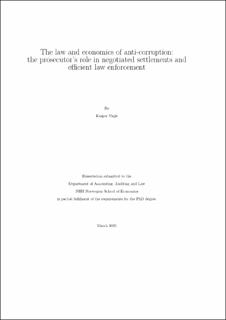| dc.description.abstract | The central topic of this doctoral dissertation is the role of the prosecutor in law enforcement of
economic crime - that is, how the organisation of law enforcement agencies, legal procedure and the
strength of institutions influence the efficiency of law enforcement. Corruption is a global problem
that inflicts serious harm to people and nations. A variety of efforts are put in place to combat
corruption. Still, we often lack information on the outcome of these efforts and how they should
be structured and organised to reduce corruption. Together with my co-authors, we explore these
challenges from three different angles.
First, we investigate prosecutors’ freedom when settling a corruption case out of court. Specifi cally, how 66 countries organise their prosecuting authority when a corruption case is settled without
a court case. We find that there is a considerable variation in how countries organise their prosecu tors. This variation influences the discretion that the prosecutor is granted to conclude corporate
bribery cases with a settlement. We find that the amount of discretion granted to the prosecutor
tends to follow a bell-shaped curve when compared to indices on social and economic development.
When a country develops, the prosecutor is granted increasingly more independence and discretion.
This freedom is later limited by regulation.
Second, we study the difference between the expected sanction in court and the certain sanction
of accepting a settlement, which we label the sanction gap. We identify aspects of law enforcement
that increase or decrease the size of the sanction gap, and the consequences the size of the sanction
gap have on the defendant’s willingness to accept a settlement offer. We find that when the sanction
gap is too large, even innocent defendants will accept a settlement offer rather than taking the
risk associated with the uncertain outcome of a court case. We argue that, per expectation, all
corporate bribery cases will end in a settlement in the United States under the current legal regime.
In contrast, we will see a mix of settlements and court cases in the United Kingdom.
Third, we evaluate the Romanian anti-corruption agency’s efforts to tackle corruption. We
identify a relationship between a corruption case and the risk of corruption in public procurement
on the municipality level. We analyse more than 200 000 procurement contracts for red flags in
public procurement. We find a significant decrease in our objective measure of corruption risk
after a corruption case. We conclude that reducing corruption risk is related to increased formal
compliance with procurement procedure rules. At the same time, the opportunity to use high-risk
procedures in public procurement remains prevalent. | en_US |
